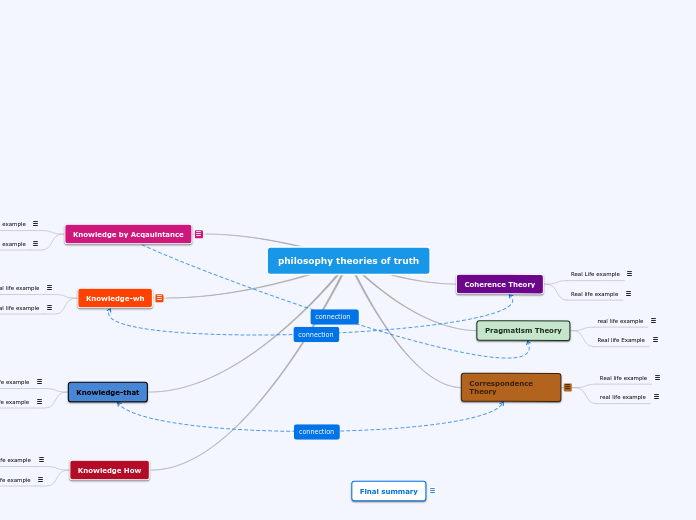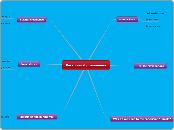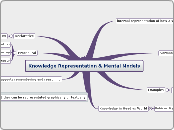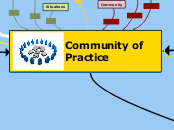Final summary
To be concise, the connections I can make between knowledge, truth, and beliefs is: For a belief to be true, it must have proper knowledge behind it which can be justified. While truth is defined as "the true or actual state of a matter". It is almost exactly the same to also be considered as "fact" or "reality". The difference between knowledge and truth is that "knowing" something does not necessarily make the statement true. Furthermore, in my own opinion I think there are better ways of attaining knowledge than others. For example, I think knowledge by acquaintance gives someone the clear state of truth, when perceiving an object or situation. This is because when someone has come face to face with an object they are seeing it with their own eyes. They are able to take in every attribute and perceive it in their own ways. Where in other knowledge theories such as knowledge-that, you might not know the underlying information to the declarative sentence brought upon you. For all you know, that declarative sentence could be untrue. To continue, you also will never be able to tell if 100% if anything is untrue, just by hearing about it. To understand if a fact is not true, you must be able to justify why that fact is untrue to you. We can filter out knowledge that we believe is untrue by questioning it and analyzing it. For that motive we would use the knowledge-wh theory. This is where we question who, why, where etc when dealing with propositional knowledge.
philosophy theories of truth
Knowledge How
another real life example of knowledge-how would have to do with anything involving any type of schooling or training required in order for a job. For example, many to most all university programs prepare you for a job in one way or another. By taking specific courses in your program, it helps to guide you on a path which prepares you for your future. The more insight one recollects on a specific topic, the more they will be willing to learn and enjoy what they are doing. This knowledge can lead to believing in a system in which, the more you know, the smarter you are deemed.
the article below written by Cardiff University does an excellent job of explaining how university prepares you for the knowledge you would need to know in the real world and going into jobs.
https://www.cardiff.ac.uk/study/undergraduate/parents-and-supporters/why-go-to-university
Why go to university? (n.d.). Retrieved from https://www.cardiff.ac.uk/study/undergraduate/parents-and-supporters/why-go-to-university
a real life example of knowledge how would be learning how to practice a new skill. Such as learning how to use a sewing machine. The following article outlines how to use a sewing machine in great detail: http://www.jenniferpwilliams.com/2013/08/how-to-use-a-sewing-machine.html
this is an example of knowledge-how because in order to use the sewing machine properly you need to be able to fully understand how it works. By gaining the knowledge from the article, website etc, you are gaining observational knowledge as well as you are using and observing the sewing machine as you are creating clothing.
A., E., & Williams, J. (2015, April 21). How to Use a Sewing Machine - Beginner's Guide. Retrieved from http://www.jenniferpwilliams.com/2013/08/how-to-use-a-sewing-machine.html
Knowledge-that
Another real life- example of knowledge-that would be the following article:
https://www.thisisinsider.com/myths-lies-learned-in-school-wrong-facts-2017-5
the article touches upon the fact that in elementary school we were given declarative knowledge. One of the main points of the article being that we were told Christopher Colombus was the first man to discover North America, when it was infact Leif Eriksen. This is where knowledge-that becomes uncredible. Even though Christopher Colombus was ONE of the first discoverers of North America, he was indeed NOT the first. Another example of knowledge-that being uncredible is also when we are taught one thing, and then when expanding on that specific subject, we are taught that the first theory was not correct and there are new ones to justify the old one. For example, within science class in elementary school, many of the lessons taught were simpler with little information as to not to confuse the students. As one ages and takes more science courses, they will realize that what their teachers were teaching them was wrong, and many of the theories and rhetorics that they once knew, were infact wrong all along.
Shamsian, J., & Singh, O. (2018, September 28). 30 'facts' you learned in school that have since been proven wrong. Retrieved from https://www.thisisinsider.com/myths-lies-learned-in-school-wrong-facts-2017-5
an example of knowledge-that is the following article:
https://www.readersdigest.ca/travel/canada/10-mind-boggling-facts-about-canada/
Knowledge-that is defined as: propositional knowledge and a declarative knowledge. It is the kind of knowledge present whenever there is knowledge of fact or truth.
the following article states 10 facts about Canada. All the facts are scientifically true, therefore it is a type of declarative knowledge.
Reid, D. (n.d.). 10 Facts About Canada That Are Guaranteed to Blow Your Mind. Retrieved from https://www.readersdigest.ca/travel/canada/10-mind-boggling-facts-about-canada/
Knowledge-wh
When someone acquires a coherence truth, they are also said to have knowledge-wh. This is because knowledge-wh asks questions such as who, what, and why, when analyzing propositional knowledge. Propositional knowledge is also known as declarative knowledge. When someone is proposing a declarative sentence, you want to know where they got their information from. Hence, you question whether their statement is true or false. This connects to coherence truth as coherence truth is a truth of a certain belief which many groups of people believe in as it aligns with their lifestyle. Furthermore, when someone is declaring that "the earth is round" that would be an example of coherence truth as the rest of the world also believes that the earth is round. This can also connect with knowledge purely by thinking, also known as rationalism, because we know that it is proven that the earth is round. So to question whether the earth is flat, would be unrational as it is already proven.
another example of knowledge-wh would be knowing who. For example, knowing who the first president of the united states was, or knowing who invented lightbulbs. By knowing who, we are able to form coherent truths with our surrounding world. For example, we know who to call when there is an emergency. Usually it would be the police. Since our government has it's own emergency system, we are coinciding with the beliefs of the rest of the country. To be more specific, everybody knows who and what number to call when they are in dire need of help.
http://chartsbin.com/view/1983
the website above gives a chart of all the emergency numbers to call in each country. This shows that each country has their own emergency systems, and the people in those countries also possess knowledge-wh when in an emergency.
ChartsBin. (n.d.). Emergency Telephone Numbers Around the World. Retrieved from http://chartsbin.com/view/1983
the definition of knowledge-wh is as follows: knowledge that includes the questions, what, who, why, whether and is also propositional knowledge.
An example of knowledge-wh would be knowing why something is important or unimportant. For example, knowing why biodiversity is important.
The following blog explains to one why biodiversity is important and how we can preserve it.
http://www.noticenature.ie/why_is_it_important.html
By knowing why biodiversity is important we are also able to know what we need to do in order to make our world a better place. By having more insight into things that "matter" we are faced with new beliefs which lead to the truth that the world is dying and we need to take care of it.
http://www.noticenature.ie/why_is_it_important.html
Knowledge by Acqauintance
The pragmatist theory of truth heavily coincides with knowledge by acquaintance. When someone has knowledge of the acquainted kind, they can apply it in the real world as a pragmatistic truth. The pragmatism theory expands on the fact that in order for something to be true, one has to have a real life interaction with it. This is also known as observational knowledge. In which knowledge can be obtained, and facts and existence can be supported when they are made from observation, memory, or inference. In this case, a belief can be justified as that person has experienced said object on a first hand basis. Since they have experienced it, they are able to compare it to other objects in the real world. To that person, the belief in which they have acqired by observational knowledge, should be almost 100% credible to them as they have seen it with their own two eyes. By observing something, and having a memory of it, the belief is considered to that of pragmatism.
another example of knowledge by acquaintance would be the video above. In the video above the guy pictured is trying fruit for the very first time in his life. This would be specific to knowledge by acquaintance because he is having a direct observation with the fruit. This knowledge can give one a pragmatistic truth as they are able to receive a full perception of that object in the real world. To be more specific, the man in the video is finally trying fruit, so he is able to experience what it tastes like. That way he is now able to compare that taste to other tastes & vice versa.
BuzzFeedVideo. (2018, March 30). This Guy Eats Fruit For The First Time Ever. Retrieved from https://www.youtube.com/watch?v=22-bSrS7ICE
Knowledge by acquaintance is defined as: knowledge obtained through a direct, casual, experience based interaction between a person or an object.
An example of knowledge by acqauaintance would be the video of an interview with the cast of The Avengers. This would be an example of knowledge between acquaintance because the interviewer is learning about the movie, and the cast through having a direct interaction with them, and talking directly to them. Knowledge by acquaintance gives people a more valid reason to experience truth or a certain belief, as the person is getting information and having a direct experience with the source of the knowledge itself
Movies, M. S. (2018, December 05). Avengers: Infinity War | Cast Interview. Retrieved from https://www.youtube.com/watch?v=4-PEtVeV7y8
Correspondence Theory
The connection between truth and knowledge in this case would be that of correspondence truth and knowledge-that. When we have a correspondence truth we also acquire a knowledge-that. This is because the correspondence theory of truth deals with objective knowledge, and the truth and falsity of a sentence determined by how it relates to the world. When we see or percept an object different from someone else, either one side can be true and the other false, vice versa, or even both sides of perception can be true, due to the fact that everyone percepts something differently.
Another example of the correspondence theory of truth would be
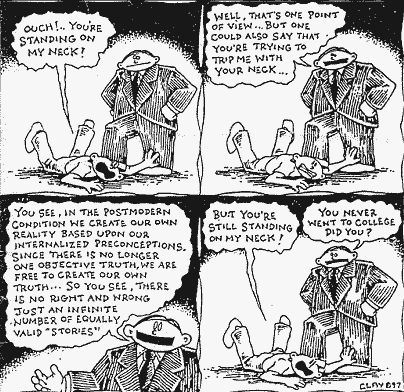
This photographic above, is an example of the correspondence theory of truth. The definition of the correspondence theory of truth is as follows: The truthfulness and falseness of a statement is determined only by how it relates to the world and whether it accurately describes, or corresponds to that world. This is as close as we come to "objective" knowledge.
Within the photo, there is a man standing on another man's neck. To that man on the floor, he is being stepped on by the larger man. But to the man with his foot on his neck, he is merely being tripped by that man's neck. In this case, neither of the men's accusations are false. If the man on the floor were to move his neck or roll, the other man would fall, causing him to trip. Which entails, both men have their own objective truths.
Pragmatism Theory
Real life Example
Another real life example of the pragmatism theory of truth would be the following article:
https://www.odditycentral.com/foods/21-year-old-woman-has-never-eaten-a-piece-of-vegetable-or-fruit.html
The article above shows the experience of a woman who has never eaten fruit or vegetables in her life. She states that, "The thought of eating vegetables or any sort of fruit makes me physically sick." Because she has never had a real interaction with a fruit or vegetable she has nothing to compare it to. Her belief of how fruits and vegetables taste have come from a weird distortion of them, since she has never had a real interaction with them. She is not willing to accept the certain truth that she actually might like vegetables, considering she has never tried them.
21-Year-Old Woman Has Never Eaten a Piece of Vegetable or Fruit. (2013, November 07). Retrieved from https://www.odditycentral.com/foods/21-year-old-woman-has-never-eaten-a-piece-of-vegetable-or-fruit.html
real life example
An example of a pragmatic theory of truth would be the following;
the following video shows Australian's seeing snow for the first time in their lives. This is a pragmatic theory of truth because they are able to see something that they have never seen in their whole lives, and be able to interact with it. This pragmatic truth of seeing snow, leads to the belief of what snow is really like. To be more exact, the Australians have only conceptually thought of snow. It was something to their imagine. They never had a true belief of what it actually was. By being able to interact with it, their beliefs have changed as they have no been able to feel how cold it was, how dense it was, etc. By interacting with an object in real life, you are more willingly able to talk about it and compare it to other things as you now have a more clear depiction of what that object really is and what it entails.
Coherence Theory
Real life example
An example of the coherence theory of truth, is as follows:
https://www.christianity.com/jesus/following-jesus/baptism/do-christians-need-to-be-baptized.html
The article listed above talks about the stigma around baptism within the catholic community. Baptism would be an example of coherence truth, because every catholic is baptised in order to proclaim themselves as catholic. It is simply just a ritual that all Catholics do. There is no real truth to why Catholics need to be baptised, but since everyone does it, it simply must be truthful.
The definition of the coherence theory of truth is as follows: bases the truth of a belief on the degree to which it coheres with all other beliefs in a system of beliefs.
Many people don't question this form of truth as most of the time, it aligns with their systems belief. Such as following a certain religion. In different types of religions there are many rituals, and routines etc. As those rituals are a part of that religion, and that religion has a following, the following of that religion is going to succumb to the traditionalist ways of what has always been done. For example, it is a Christian belief to go to church every Sunday. As that is what the majority of people do in that religion, everyone abides by and follows that truth. Not many religious people question their religion as it has taught them values, and morals etc.
Do Christians Need to Be Baptized? (n.d.). Retrieved February 28, 2019, from https://www.christianity.com/jesus/following-jesus/baptism/do-christians-need-to-be-baptized.html
Real Life example
An example of the coherence theory of truth is as follows:
a drunk driver is driving on the highway and says "There's a pink elephant dancing in front of us."
we can assess whether his belief is true, due to the beliefs that we already know and have accepted.
1)elephants are grey
2) the area that we are in is not home to elephants
3)there is neither a zoo or circus nearby
4) severly intoxicated people are known to have hallucinations
but the most important coherent claim is;
no one else in the area claims to see the pink elephant the drunk driver is seeing.
Swartz, N., & Downden, B. (n.d.). Retrieved from https://www.iep.utm.edu/truth/#H5
